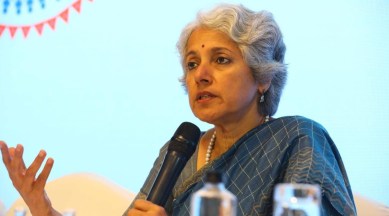Click here to join Express Pune WhatsApp channel and get a curated list of our stories
Covid not over, few nations may see wave of infections: WHO chief scientist
“We, at WHO, are also tracking derivatives of BA.5 and BA.1, which are more transmissible and immune evasive,” Dr Soumya Swaminathan said.

The Covid pandemic is not over yet, Dr Soumya Swaminathan, chief scientist at World Health Organisation (WHO), said on Thursday, adding that the WHO is tracking all Omicron subvariants and it is likely that a few countries may see a wave of Covid infections because of XBB– a recombinant. “We, at WHO, are also tracking derivatives of BA.5 and BA.1, which are more transmissible and immune evasive,” she added.
“Every three months, there is a meeting of the emergency committee and globally, around 9,000 deaths are reported every week. Also, just recently, the WHO director general announced that Covid-19 continues to be a public health emergency of international concern and all of the tools need to be used wisely – the most important being vaccines,” Dr Swaminathan said. “There are over 300 sub-variants of Omicron and among those of concern now are XBB sub variants and a few others. The virus will evolve to become more and more transmissible,” she added. However, Dr Swaminathan said, presently, there is no data available from any country to suggest that these new sub-variants are clinically more severe and cause an increase in hospitalisations.
“Testing and genomic surveillance, though, has gone down in the last few months and strategic sampling is needed so that these new variants can be tracked,” the chief scientist told media persons on the sidelines of the three-day annual general meeting of the Developing Countries Vaccine Manufacturers Network (DCVMN) and Serum Institute of India (SII) in Pune.
“Few of these sub-variants are recombinant that have been seen before. This is genetic material from two different virus’ strains combined together, which is immune evasive – means being able to overcome the antibody responses that people have developed against Covid and it is likely that some countries may see a wave of infections because of XBB,” Dr Swaminathan said.
The WHO chief scientist said the goal is 100 per cent vaccine coverage of people above 60 apart from health care workers who should be immunised. Sub-groups are important as they are likely to face maximum morbidity and mortality, she added. “We saw with the Omicron wave that there were deaths among the elderly group that was not fully vaccinated. Uptake of booster dose is low in many countries, including in India. We need to encourage people, especially those in the vulnerable groups, to take the dose,” Dr Swaminathan added.
Dr Swaminathan also spoke about the importance of wearing masks in crowded places and in closed spaces. Warning against treating Covid like flu, she said, “We should not be too causal, it is not like flu. It gets into the body through the respiratory route but infects the cardiovascular system and we have seen the risk of diabetes has doubled a year after Covid. Hence, there is a need to reduce and limit infections and get properly vaccinated,” Dr Swaminathan added.
On vaccine-effectiveness, the WHO chief scientist said that countries need to continue to monitor and track new infections and analyse data by sex, age and vaccination status. It is also important to strengthen pharmacovigilance systems, she added.
Earlier, at the inaugural session, Dr Swaminathan said, “Vaccines play an important role by preventing diseases, saving lives, improving and increasing life expectancy, and ultimately, improving the country’s economy. In terms of the landscape for the future, there is a huge gap between diseases that are causing morbidity and mortality in countries, and the availability of vaccines – it is not just for childhood vaccinations, but vaccination across the life course. And this is what the immunisation agenda 2030 talks about, the adult vaccines that must be developed.”
She added, “On these lines, I would like to congratulate the health minister and SII for the HPV vaccine which is soon going to go out in full-scale across India. This is what we must see across the world, especially in low-middle income countries.”
‘Gambia children deaths a serious issue’
“The deaths of children in Gambia is a serious issue and has to be taken seriously,” Dr Swaminathan said. The WHO had issued a medical product alert relating to four contaminated cough syrups that have caused acute kidney injuries and linked it to deaths of 66 children in the Republic of Gambia. “The Indian government is in contact with the WHO,” Dr Swaminathan added. “There should be a mechanism to identify weaknesses in the current system and strengthen it. For instance, we need to see how we can harmonise the role of central and state regulators. We need to look at the operational roles. Besides, products made in one state also need to undergo inspections by regulators of other states,” she said.
Click here to join Express Pune WhatsApp channel and get a curated list of our stories